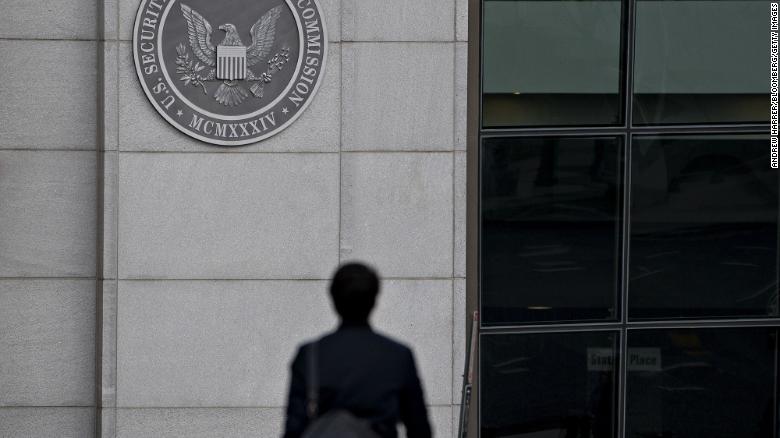Glenn Greenwald On His Resignation From The Intercept
The Pulitzer winner founded the Intercept to challenge official narratives and protect editorial freedom. When editors abandoned those principles, spiking a controversial story, he was forced to quit
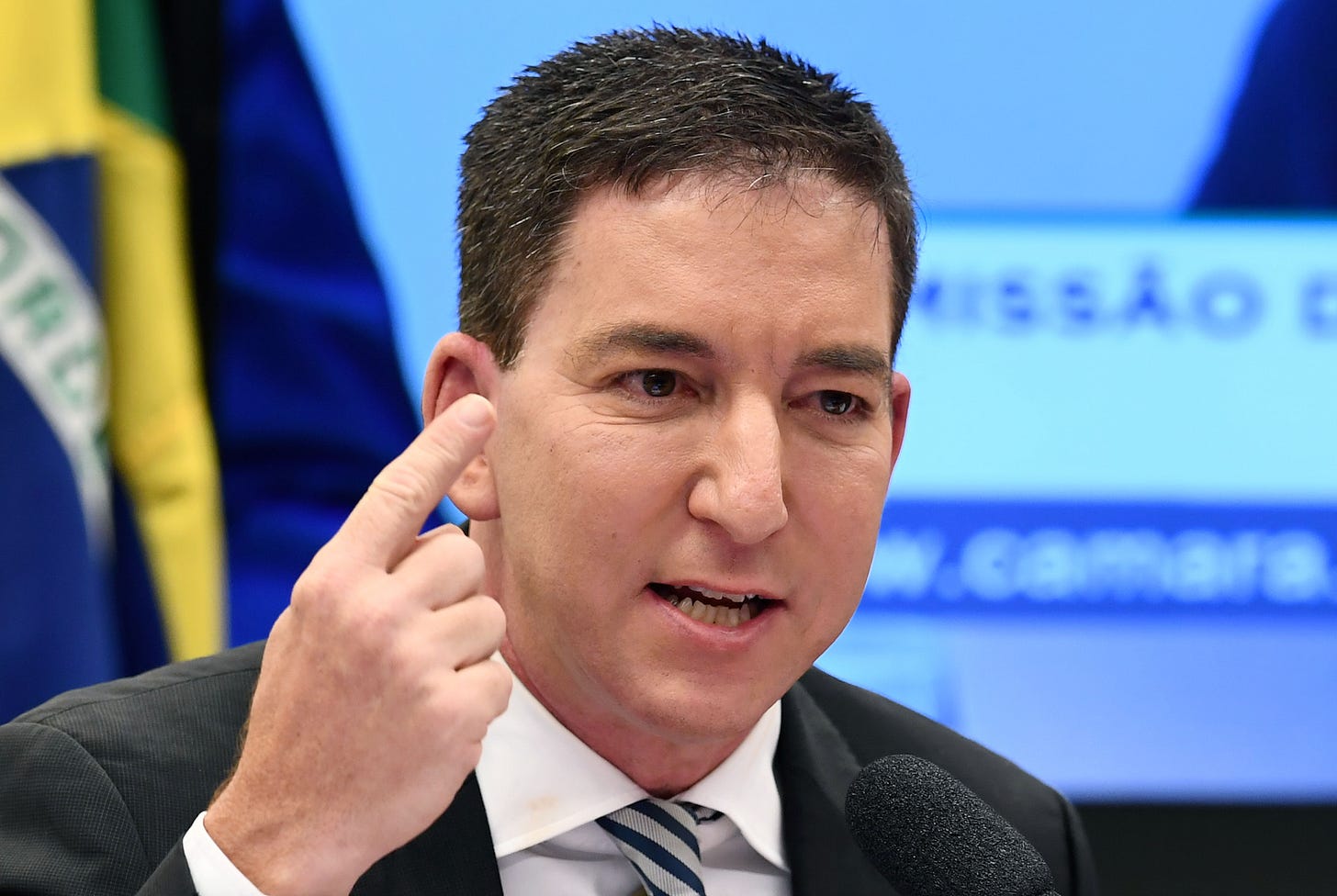
Pulitzer Prize-winning journalist Glenn Greenwald quit his job this morning. In a bizarre, ironic, and disturbing commentary on trends in modern media, the celebrated reporter was forced to resign after writing a story criticizing both the Biden campaign and intelligence community — only to have it spiked by the editors of The Intercept, the news outlet he co-founded six years ago with the aim of preventing pretty much this exact situation.
"The irony," Greenwald says, "is that a media outlet I co-founded, and which was built on my name and my accomplishments, with the purpose of guaranteeing editorial independence, is now censoring me in the most egregious way — about the leading presidential candidate, a week before the election."
Greenwald becomes the latest high-profile journalist to leave a well-known legacy media organization to join Substack. You'll be able to read the piece rebuffed by The Intercept at his new site here.
In a nutshell, the fatal sequence of events went as follows:
Greenwald, after commenting pointedly about the reaction by press and Democratic Party officials to the New York Post story, reached out to Intercept editor Betsy Reed to float the idea of writing on the subject.
The first hint of trouble came when Reed suggested that yes, it might be a story, if proven correct, but "even if it did represent something untoward about Biden," that would "represent a tiny fraction of the sleaze and lies Trump and his cronies are oozing in every day."
When Greenwald retorted that deciding not to report on one politician's scandals because those of another politician are deemed worse is a "corrupt calculus" for reporters, Reed expressed concern. Based on this, on his comments on Twitter, and other factors, she worried that "we are headed for a conflict over the editing of this piece."
Greenwald insisted he wasn't planning an overwhelming amount of coverage but wanted to do a single article, reviewing the available facts and perhaps asking the Biden campaign to comment on the veracity of the Post story. Reed agreed that he should write a draft, then they could "see where we are."
An aside: when reporters and editors interact, they speak between the lines. If an editor only ever suggests or assigns stories from a certain angle, you're being told they don't particularly want the other angle. If your editor has lots of hypothetical concerns at the start, he or she probably won't be upset if you choose a different topic. Finally, when an editor lays out "suggestions" about things that might "help" a piece "be even stronger," it's a signal both parties understand about what elements have to be put in before the editor will send the thing through.
Reed explained that any piece Greenwald wrote on the Biden/Burisma subject would have to go through "the editorial process and fact-checking that we do with any story with this kind of high profile." Peter Maass would edit, but Reed also noted that there was a lot of "in-house knowledge" they could all "tap into."
By "in-house knowledge," she meant the work of Robert Mackey and Jim Risen, two Intercept reporters with whom Greenwald clashed in the past. Risen had already loudly denounced the Post story not only as conspiracy theory, but foreign disinformation. Essentially, Reed was telling Greenwald his piece would be quasi-edited by people with whom he'd had major public disagreements about Russia-related issues going back years.
To this, Greenwald responded that this was a double-standard: when Risen wrote an article credulously quoting intelligence officials like James Clapper, John Brennan, and Michael Hayden (more on the extreme irony of this later) describing the Post story as having "the classic earmarks of Russian misinformation," he could do so willy-nilly. But when Greenwald wanted to write an op-ed piece questioning the "prevailing wisdom on Biden and Burisma," a team of people would would be summoned.
"The only reason people are getting interested in and ready to scrutinize what I write is because everyone is afraid of being accused of having published something harmful to Biden," Greenwald told them. "That's the reality."
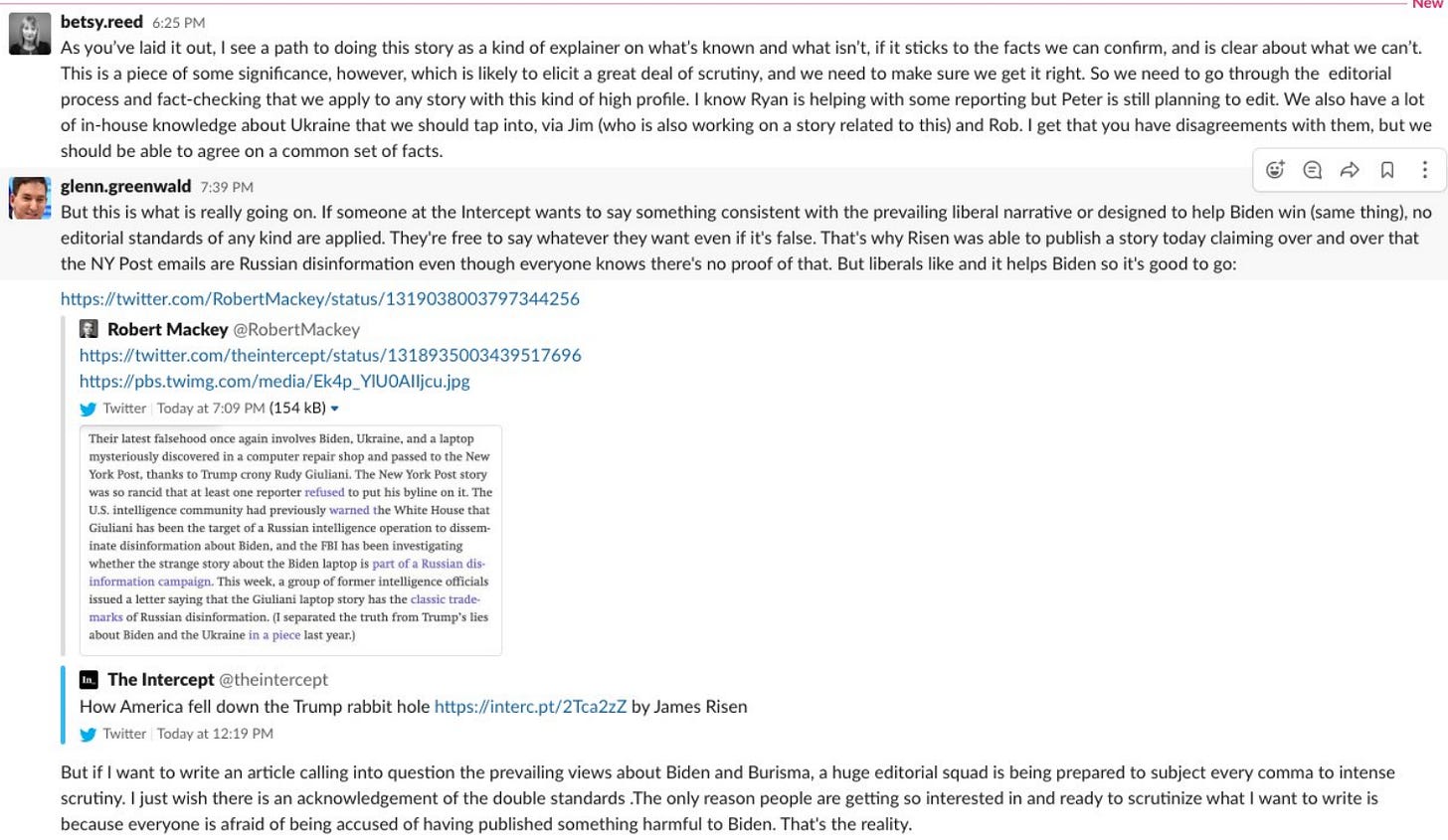
Then Greenwald wrote the piece — essentially an opinion piece, drawing upon publicly available information. In it, he criticized the media response to the Post story and noted, among other things, that the history of the Hunter Biden/Burisma story did not reflect well on any of the Bidens. Reed and Maass refused to publish it. Maass wrote:
Betsy agrees with me that the draft's core problem is the connection it often asserts or assumes between the Hunter Biden emails and corruption by Joe Biden. There are many places in which the explicit or implied position is a) the emails expose corruption by Joe Biden and b) news organizations are suppressing their reporting on it. Those positions strike me as foundations to this draft, and they also strike me as inaccurate.
Maass added that he didn't believe Greenwald had done enough to address the "complexity" of the "disinformation issue":
Lastly, I think the disinformation issue should be handled with greater complexity. I think it's totally right to point out the haste with which some journalists and experts are talking about Russia's hand. But the argument that some people make about disinformation, and that I think you should address, is the way the materials are being used by Giuliani, the rightwing media, and Trump, to support an exaggerated and false narrative – a narrative that is not supported by the materials themselves…
Maass suggested Greenwald cut the piece and stick to a narrower essay about whether or not the press was directly asking Biden enough questions. Another irony: Greenwald was trying to criticize the rush to describe the Post story as disinformation, and Maass was essentially asking that he address the "disinformation issue," even though the material's veracity had not been denied, and the editors themselves didn't seem to believe the laptop material was fake. Reed at one point wrote to Greenwald, "I agree with you that [the emails] appear to be mostly or entirely genuine, though authentication has been difficult in part because of the Biden camp's refusal to address questions about authenticity."
Greenwald, by then furious, noted that neither Maass nor Reed had identified a factual inaccuracy in the article, but rather disagreed with its conclusions and his assessments of the facts — his "positions," rather than his information.
Greenwald added:
What a healthy and confident news organization would do -- as the New York Times recently did with its own Pulitzer-winning 1619 Project -- is air the different views that journalists have about the evidence and let readers decide what they find convincing, not force everyone to adhere to a top-down editorial line and explicitly declare that any story that raises questions about Biden's conduct is barred from being published now that he's the Democratic nominee.
In the end, Maass and Reed would not budge, and Greenwald resigned rather than accept what he described as being censored. The Intercept quickly put out an icy statement describing him as a "grown person throwing a tantrum," adding that Greenwald was laboring under the assumption that "anyone who presumes to edit him is a censor."
Anticipating the obvious criticism that the Intercept had betrayed its founding mission, they wrote, "It is Glenn who has strayed from his original journalistic roots, not the Intercept." Mourning the reporter he "used to be," the Intercept editors defined the value that Glenn supposedly lost sight of as "an investigative mission… that involved a collaborative process." In other words, absolute editorial freedom — but by group consent.
They then pulled out the go-to rhetorical device of media hall monitors in the Trump era, accusing him of being a secret Trump partisan, trying to "recycle… the Trump campaign's… dubious claims, and launder them as journalism."
I reached out to both Reed and Maass for comment this afternoon. Neither has responded.
In the last few weeks I've heard from multiple well-known journalists going through struggles in their newsrooms, with pressure to avoid certain themes in campaign coverage often central to their worries. There are many reporters out there — most of them quite personally hostile to Donald Trump — who are grating under what they perceive as relentless pressure to publish material favorable to the Democratic Party cause. Greenwald's story mirrors some of these stories, but his is more striking than some others on a few levels.
Many outside the media world will miss the subtleties of what makes this tale so crazy. Some may even think it's unreasonable for a reporter to quit rather than "accept editing." To understand why that's not what's going on here, one has to know the unique history of The Intercept.
On February 10th, 2014, Greenwald, documentarian Laura Poitras, and fellow reporter Jeremy Scahill announced the creation of an aggressive new investigative outlet, backed by the deep pockets of eBay founder and billionaire Pierre Omidyar.
It was big news in the media world. Greenwald and Poitras had been working on one of the great scoops in recent times, helping former NSA contractor and whistleblower Edward Snowden come forward about a secret, illegal mass surveillance program conducted by the U.S. government. After bringing the story to light, Snowden was forced into exile, and Greenwald in particular became the subject of denunciations by colleagues and politicians alike, with some prominent officials openly calling for his prosecution and jailing.
The Intercept was designed specifically to be a place where journalists would be protected from such intimidation and editorial interference. As they wrote in their introduction:
Over the past seven months the journalists who have reported on these documents from the National Security Agency have been repeatedly threatened by a wide range of government officials… None of this will deter the journalism we are doing. A primary function of The Intercept is to insist upon and defend our press freedoms from those who wish to infringe them.
Greenwald recalls today: "We saw in the media, reporters were quoting CIA officials about Snowden and about me. They were essentially stenographers. The Intercept was created to avoid that."
Again as noted in the announcement six years ago, Intercept writers were to be encouraged at all times to speak their minds, no matter who might take offense. This, they said, was another core part of the organization's mission:
The editorial independence of our journalists will be guaranteed… Our journalists will be not only permitted, but encouraged, to pursue stories without regard to whom they might alienate.
The whole idea of The Intercept was to create a hands-off, journalist-run enterprise where mistakes like the WMD fiasco could never happen. If the journalists themselves were put in charge, the thinking went, there could be no pressure from above to conform to clearly flawed official narratives like the WMD case, or to back off stories like the Snowden affair.
The traditional method of controlling the press — as described by legendary independent journalists like I.F. Stone — was the quiet aside by the boss, "a little private talk," where a "hint that the reporter seems irresponsible, a little bit radical" would be dropped. Getting the message, and fearing for his or her job, the reporter would back off. Or, in cases like the Iraq war runup, the strategic dismissal of a big name with the wrong views — Phil Donahue, Jesse Ventura — makes sure the rest of the employees get the message.
Greenwald co-founded the Intercept with this exact scenario in mind, building a structure where "little private talks" with bosses would never happen, and there couldn't be high-profile dismissals for ideological reasons.
What he didn't guess at was that even in an atmosphere where managerial interference is near zero, a collective of independent journalists can themselves become censors and enforcers of official orthodoxies. In some cases, free journalists will become more aggressive propagandists and suppressors of speech than the officials from whom they supposedly need to be protected. This Lord of the Flies effect is what happened with The Intercept.
It's a long story, but the punchline is that the self-editing journalists at the Intercept somewhere along the line began to fall for what will look, years from now, like a comically transparent bait-and-switch operation. They were suckered into becoming parodies of their original incarnation.
In the Obama years, progressive journalists were infuriated by the disclosures of whistleblowers like Snowden and Chelsea Manning, and aimed their professional ire at the federal government for war crimes, drone assassination, and mass abuse of surveillance authority. The bugbears of the day were intelligence officials who ran these programs and deceived the public about them: people like CIA directors Hayden and Brennan, and Director of National Intelligence Clapper.
These intelligence community leaders only a few short years ago served an administration that sought a "reset" with the systematic human rights violator that was Vladimir Putin's Russia, a country then-President Obama dismissed throughout his tenure as a "regional power" that acts "not out of strength, but out of weakness." The consistent posture of the Obama administration — the Obama-Biden administration — was that Russia ranked far below terrorists as a potential threat to the United States.
After 2016, however, these officials presented themselves as norms-defending heroes protecting America against the twin "existential" threats of Donald Trump and Vladimir Putin. Russia, just a few years ago described by Rachel Maddow as a harmless "gnat on the butt of an elephant," was now reinvented as an all-powerful foe mounting an influence campaign of unprecedented reach, with everyone from Trump to the Green Party to blogs like Truthdig and Naked Capitalism, to congresswoman and war veteran Tulsi Gabbard, to Bernie Sanders, all potentially doing the bidding of a Cold War foe bent on "sowing discord" on our shores.
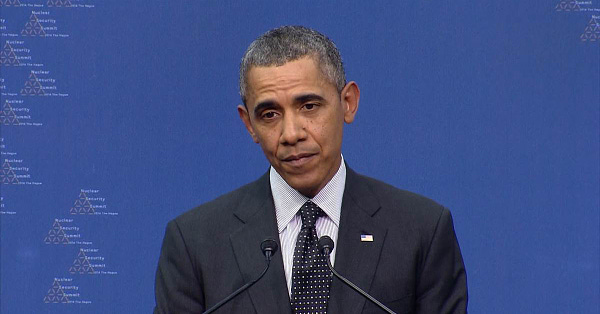 Putin's ego a target for Obama's sharp witRachel Maddow shows how Pres. Barack Obama's ability to deliver a witty insult has taken a role in the tense relationship between the U.S. and Russia as Vladimir Putin's sensitive ego becomes a target.msnbc.com
Putin's ego a target for Obama's sharp witRachel Maddow shows how Pres. Barack Obama's ability to deliver a witty insult has taken a role in the tense relationship between the U.S. and Russia as Vladimir Putin's sensitive ego becomes a target.msnbc.comA key part of this propaganda campaign was the continual insistence that any criticism of the Democratic Party was, in essence, aid and comfort to our Red Enemy. Would-be progressive journalists horrified by Donald Trump accepted this logic with enthusiasm. Over the course of four years they abandoned their traditional mistrust of the security state to transform themselves into a squad of little Pavik Morozovs, anxious to stamp out traitors to the cause and keep the news business clean of "Russian" misinformation that might help Donald Trump get re-elected.
Greenwald never bought this line. In July of 2017, he reported on the creation of new organizations like the Alliance For Securing Democracy, that united Bush-era neoconservatives like Jamie Fly with Democrats like Hillary Clinton foreign policy advisor Laura Rosenberger. Groups like this, and the Atlantic Council, advocated for more aggressive foreign policy aims and tighter controls over Internet content, using new paranoia about Russia as the glue for the expanding alliance.
As press enthusiasm for the Trump-Russia story widened, progressives began to invite old enemies back into the fold. People like "Axis of Evil" speechwriter David Frum and Weekly Standard editor and key Iraq War proponent Bill Kristol became regular guests on CNN and MSNBC, while ex-spooks like Brennan, Clapper, Hayden, and a long list of others were given TV contributor deals, now serving as the press instead of facing criticism from it.
"The prevailing power center is Silicon Valley, Wall Street, and the Democratic Party," Greenwald says. "In the Trump era, they managed to convince everyone to view anyone who opposes Trump as allies."
Greenwald's opinions on these issues attracted indignation from former friends and colleagues alike, who denounced his criticism of Democrats as unpatriotic and unacceptably immoral behavior for an ethical reporter in the Trump era. He began to be criticized, by journalists, for refusing to take the word of secret services.
When the New Yorker wrote an astonishingly vicious profile of Greenwald, describing his refusal to accept theories of Russian subversion as a pathology inspired by a difficult childhood and confusion over his sexuality, his nominal boss and co-worker, Reed, was happy to chime in about things Greenwald does that are "not helpful to the left."
She talked about Greenwald having inspired social media followers "who are so convinced that they are being lied to all the time that anything that the intelligence community says can't possibly be true." She added that "it's not helpful to the left and to all the candidates and causes we favor to continue to doubt the existence of some kind of relationship between Russia and the Trump campaign."
Meanwhile, Greenwald's former editor at Salon, Joan Walsh, said Greenwald's refusal to buy the Russia story was "motivated by real disdain for what the Democratic Party has become," which she explained meant:
The ascendance of women and people of color in the Party, and the fact that that coalition defeated Bernie Sanders.
All agreed that Greenwald couldn't possibly just have a different opinion, or be insisting on seeing evidence before believing a collusion story that, by the way, turned out to be wrong. His ideas came from being sexually confused, misogynistic, racist, and financially desperate.
Or was it even worse? Glenn more than anyone got the treatment other reporters like myself, Aaron Mate, and Ken Vogel of the New York Times got, for crossing established narratives on Russia or Ukraine: he was accused of being a Russian stooge, even a literal spy. His favorite critics on that score have been those same old, once-disgraced neoconservatives, as well as officials in the Democratic hierarchy, and, of course, other reporters:
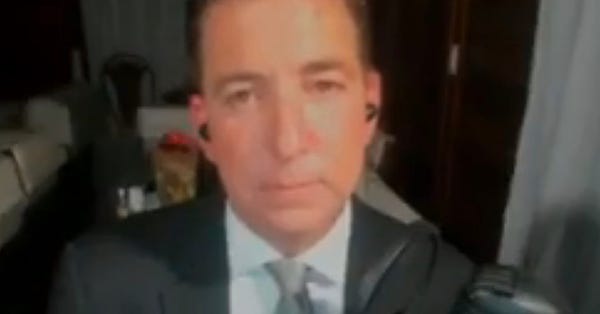 Glenn Greenwald: Media and Intel Community Working Together To Manipulate The American PeopleGlenn Greenwald appeared on Tucker Carlson's FOX News show Monday night to criticize the media for its lack of response to the Hunter Biden laptop story. Greenwald also criticized intel community activity in domestic elections and posed the question that even if Russians are behind the story it just…realclearpolitics.com
Glenn Greenwald: Media and Intel Community Working Together To Manipulate The American PeopleGlenn Greenwald appeared on Tucker Carlson's FOX News show Monday night to criticize the media for its lack of response to the Hunter Biden laptop story. Greenwald also criticized intel community activity in domestic elections and posed the question that even if Russians are behind the story it just…realclearpolitics.comThroughout the last four years, Greenwald has been one of the only people in the media world to speak out about some of the more preposterous claims made by Democratic Party partisans, from the pee tape to charges that Tulsi Gabbard is a Russian asset to walked-back bombshell stories like the Afghan bounty story. One of his consistent themes is that only a person like him, with fame and financial security, is able to safely challenge orthodoxies in this business.
The significance of what's happened with the Intercept is that even journalists working in companies they founded can't get away from these pressures. For every public story like Greenwald's, there are dozens more you don't hear about, involving media members who can't speak out. Not all of them are dealing with the same issues, but dynamics are often similar.
The Intercept and many media outlets have gotten turned around by the Trump phenomenon. It's a difficult time for reporters, with an unstable and potentially dangerous president. Some have been convinced to change the way they used to do business, to make sure they are not accused of having helped such a person get elected.
Many in the press have therefore talked themselves into the proposition that questioning things like the Trump-Russia collusion theory, or the reflexive dismissal of adverse information about politicians like Biden as foreign disinformation, can have no purpose beyond pro-Trump partisanship. In service of this, they've surrendered their own traditional roles as questioners and arbiters of fact, giving that power over to the same people and institutions whose poor performance, record of deception, and corruption helped inspire voters to make such a desperate choice in Trump in the first place. They've not only allowed intelligence community narratives to drive the press, they've invited it.
When the likes of Brennan, Clapper, and Hayden wrote a joint letter decrying the recent Post story as a seeming Russian mischief, they were very careful in what they said. They used the term "information operation" instead of "misinformation," and prominently included the line, "We do not have evidence of Russian involvement."
However, in the recent Intercept story quoting that letter, describing the Post story has having "the classic earmarks of Russian misinformation," the the line about not having evidence was left out.
"The CIA letter was more honest than The Intercept," is how Greenwald puts it.
A few years ago, reporters had the intelligence community on the defensive. Now, reporters are ratting each other out on their behalf, with the aim of creating an absolute political monoculture. Having pushed out one of journalism's most accomplished members, they've nearly succeeded.
See the article online on Substack here: https://taibbi.substack.com/p/glenn-greenwald-on-his-resignation
bit.ly/MasterFeeds


